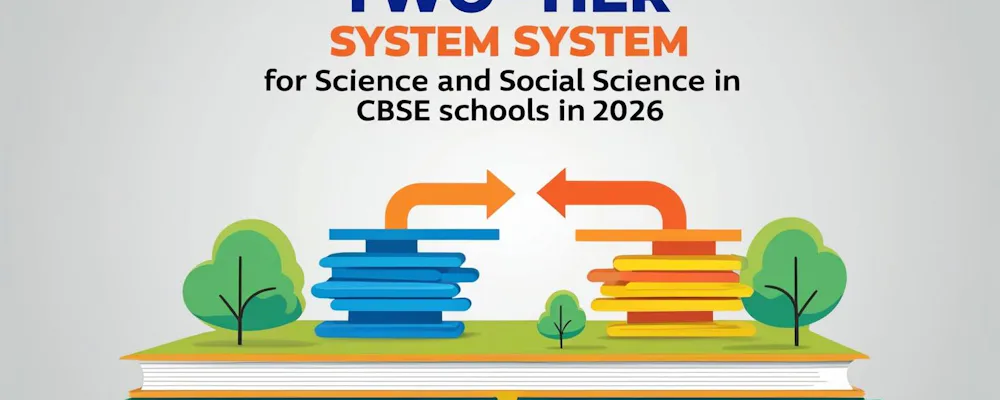
In a groundbreaking educational reform, the Central Board of Secondary Education (CBSE) is set to introduce a two-tier difficulty system for Science and Social Science subjects. This significant change, which will offer both standard and advanced levels, has now received official approval from CBSE's Governing Body, the highest decision-making authority of the Board.
The new two-tier system will be implemented for Class 9 students starting in 2026, with the first Board examinations under this framework taking place in 2028 for Class 10. This development, reported by many sources on December 4, 2024, marks a major shift in CBSE's approach to these core subjects.
For the Class 10 Board examination in 2028, the implementation could take one of two forms:
According to sources familiar with the matter, the final format is still under consideration.
This curricular reform aligns perfectly with the recommendations outlined in the National Education Policy (NEP) 2020, which suggests that "all subjects and corresponding assessments, beginning with Mathematics, could be offered at two levels, with students doing some of their subjects at the standard level and some at a higher level."
The move follows CBSE's existing two-tier approach to Mathematics, which has been offered at both Standard and Basic levels since the 2019-20 academic year. While the Mathematics model features identical syllabi for both levels with variations in question complexity, the exact structure for Science and Social Science is still being finalized.
One of the key motivations behind offering advanced levels in Science is to better prepare students for competitive entrance examinations like the Joint Entrance Examination (JEE).
"Currently, because the school curriculum is not considered advanced enough to help students prepare for entrance exams, they end up enrolling in coaching classes," an official noted. The advanced level option could potentially reduce dependency on external coaching by providing more rigorous academic preparation within the school framework.
As CBSE transitions to this new two-tier system, making the right choice between standard and advanced levels will be crucial for students' academic success, particularly in Science. Pracbee's innovative AI-powered assessment platform offers a scientific approach to this decision-making process by conducting specialized diagnostic tests that precisely identify each student's strengths and weaknesses in Science subjects.
The AI system administers customized assessments that evaluate comprehension across different difficulty levels in Physics, Chemistry, and Biology, providing detailed analytics on topic-wise performance. These targeted tests simulate both standard and advanced question patterns that students will encounter in the new CBSE Science format, giving them a realistic preview of what to expect.
Beyond assessment, Pracbee's 1:1 coaching and personal mentoring services provide individualized support crucial for navigating the new two-tier system. Expert science mentors work directly with students to interpret assessment results and develop personalized learning strategies tailored to their specific needs. This one-on-one attention allows coaches to address individual learning styles, pace instruction appropriately, and provide immediate feedback on practice problems.
Personal mentoring helps students develop effective study habits, time management skills, and test-taking strategies specifically designed for either the standard or advanced level of Science. Mentors also provide emotional support and motivation, building students' confidence as they prepare for this new educational format. The personalized guidance ensures students receive targeted help with challenging concepts rather than generic instruction that might not address their specific difficulties.
For students preparing for the advanced tier, Pracbee's AI-driven practice tests and personal coaching gradually increase in complexity, building the problem-solving skills necessary for both Board exams and competitive entrance tests like JEE. Those better suited to the standard tier receive focused assessments and mentoring targeting core scientific conceptual understanding and application-based learning.
By combining AI assessment technology with human expertise through personal mentoring, Pracbee's platform ensures students build the strongest possible foundation for success in the Science component of the new two-tier CBSE system.
To support this significant curricular change, the National Council of Educational Research and Training (NCERT) has been tasked with developing new textbooks for both Science and Social Science subjects. These new materials will include additional sections containing content specifically designed for the advanced level.
This development is part of NCERT's broader initiative to align all textbooks with the National Curriculum Framework for School Education 2023. The phased rollout of new textbooks has already begun:
Under the new system, students will be required to choose between standard and advanced levels for both Science and Social Science when they enter Class 9. However, in a student-friendly move, CBSE is considering allowing flexibility for students to switch levels even in Class 10, though the final decision on this option is still pending.
To ensure a smooth transition and gather valuable feedback, CBSE has already launched a pilot program across 30 selected schools. These institutions are currently implementing the two-tier system and conducting internal assessments at both standard and advanced levels based on student choice.
The primary purpose of this pilot is to gauge reactions from all stakeholders—students, teachers, and parents—and to identify potential challenges before the nationwide implementation. The insights gathered from this pilot phase will likely inform refinements to the program before its official launch.
This reform represents one of the most significant changes to CBSE's assessment structure in recent years and signals a move toward more personalized education that acknowledges varying student aptitudes and career aspirations.
The two-tier system could potentially revolutionize how students engage with Science and Social Science subjects, allowing those with specific academic interests to pursue more challenging content while ensuring others master essential concepts at an appropriate level.
As 2026 approaches, schools, students, and parents should stay informed about further developments and prepare for this important transition in secondary education.
This blog will be updated as more details about the implementation of the two-tier system become available.